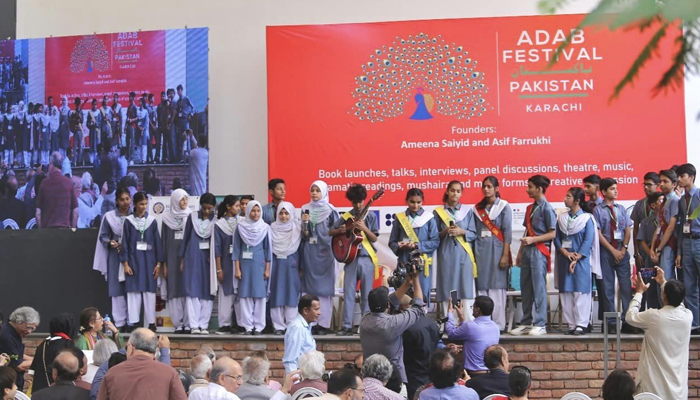Adab Festival shares success stories of women’s cultural spaces in Karachi, Hyderabad
Titled 'Dasht Mein Saman Aur Gulab: Creating Public Cultural Spaces', the session was moderated by Shoaib Ahmed
Speakers at a session of the Fifth Adab Festival that started on Saturday shared inspiring tales of how they, while defying the odds, created public spaces for people, especially women, to enable them to mingle, spend time together and engage in intellectual discussions.
Titled 'Dasht Mein Saman Aur Gulab: Creating Public Cultural Spaces', the session was moderated by Shoaib Ahmed. Ameena Saiyid, the founder and director of the Adab Festival, said when she started the Karachi Literature Festival in 2010, the first event was held at the Carlton Hotel in Defence Housing Authority (DHA) and was attended by 5,000 people. Author-historian William Dalrymple, who came to Pakistan on her invitation, was astonished by the number of people attending the first KLF saying when he organised the first Jaipur Literature Festival, only 40 people attended the event, she added.
"We faced criticism for hosting the festival at a DHA hotel for 'elite people'," she recalled, adding that she then decided to hold the future events at a venue accessible even by buses. "Unfortunately, at that time, there were limited public spaces available for such gatherings. Therefore, I opted for the Beach Luxury Hotel, which is near to Lyari, making it possible for schoolchildren to attend via buses. This change proved to be a great success, drawing a great number of attendees," she said.
"I realised two things: firstly, festivals should be hosted at locations accessible by public transport and secondly, they should be free of cost and without any ticket.
“Thirdly, we have no VIP culture at these festivals. I rejected the idea of reserved sofas at the front row for VIPs. Whoever arrives first, regardless of their status, takes the seat first, even if he is a driver. Public spaces are vital for community development. The government should invest in creating such spaces and providing facilities such as permanent tents and toilets," Saiyid said.
Saheli Ki Baithak
Rani Baloch, who runs Saheli Ki Baithak, a dedicated public space for women in Lyari, shared: "We initiated this space for Lyari women because usually men have tea Dhabas where they can gather, whereas women face challenges in finding a place to come together and spend time."
She said establishing such a space in a neighbourhood like Lyari, erstwhile famous for the drugs, gangs and war, was very challenging. "It took us a decade to have a proper space that is now where women gather. I was a student in 9th-10th grade when I went there to study, our ma’am Maira owns the space. I am currently overseeing it in her absence." she added.
At the facility, Rani said they provided free education to children who had never gone to school. Children studied there for a few months, after which they were enrolled in formal schools, she said, adding that the community centre also offered an internship programme called ‘Lyari Kicks’ where they trained girls in football.
"Women come to Saheli Ki Baithak to spend time together and celebrate birthdays. They feel safe and appreciate the space."
Cafe Khanabadosh
Amar Sindhu, who runs the Cafe Khanabadosh in Hyderabad, said café culture had been very popular in the city. In the 60s and 70s, there were many tea houses in the city where literary discussions would take place, she remarked. There were many Iranian cafes but when it came to women there was no space for them, she said.
She lamented that Hyderabad was referred as a cultural hub and the cultural capital city of the province, but it had no public space for women. While there were places for literary gatherings, none was specifically available for women, she said.
“There was segregation in rural areas, unlike in urban cities like Karachi, where such segregation did not exist,” she recalled.
“When you travel from urban to rural areas, you will observe that a man, no matter how secular, liberal, and progressive he may be, often has a separate gathering space or "baithak" for men.”
She said this atmosphere created the need for the creation of something like the Khanabadosh Café.
Sindhu said she even faced resistance from progressive people after the cafe was established. If there was greater participation from women in any event in Hyderabad, it was in the festivals and other literary programmes organised by Khanabadosh Café, she added.
She maintained that even government-sponsored cultural and literary events did not attract such active female participation. She said Khanabadosh was a secure space for women and such spaces should be elsewhere too.
Arfana Mallah, who co-manages the Cafe Khanabadosh, recalled that when she was actively involved in activism and organised protests with men, men would usually go to Autaq after the protests while women returned to their homes because of lack of spaces for them.
She said that Sindhu had been paying rent for the place where the cafe is established from her salary and she also faced negative propaganda in initial years.
Addressing the issue of lack of resources for creating and running such spaces, National Academy of Performing Arts Chief Executive Junaid Zuberi said we all had limitations when it came to funding.
He said the solution to this problem was public collaboration in such projects. “When we join hands — two people or two institutions — the impact is even bigger.”
There should be book clubs, reading clubs and spaces where people can engage in intellectual discussions, he said, adding that such spaces did not require significant expenditure. Habitt's Munis Abdullah also spoke on the occasion.
-
 Prince Harry Shows Support To Elizabeth Hurley In Court After His Emotional Testimony
Prince Harry Shows Support To Elizabeth Hurley In Court After His Emotional Testimony -
 Amelia Gray Reflects On Her Unconventional Career Journey
Amelia Gray Reflects On Her Unconventional Career Journey -
 Heath Ledger, 'Dark Knight' Star, Remembered On 18th Anniversary
Heath Ledger, 'Dark Knight' Star, Remembered On 18th Anniversary -
 Trump Launches ‘Board Of Peace’ In Davos: Inside Governance, Mandate & Members
Trump Launches ‘Board Of Peace’ In Davos: Inside Governance, Mandate & Members -
 Martin Short Almost Ruined Key Moment Of Selena, Benny's Wedding: Deets
Martin Short Almost Ruined Key Moment Of Selena, Benny's Wedding: Deets -
 This Pixel Phone Feature May Leak Your Calls: Report
This Pixel Phone Feature May Leak Your Calls: Report -
 Ubisoft: Shares Plunge Amid Restructuring Plan And Wave Of Games Cancellations
Ubisoft: Shares Plunge Amid Restructuring Plan And Wave Of Games Cancellations -
 Meghan Markle 'not Anxious' About Prince Harry Moving To UK: Here's Why
Meghan Markle 'not Anxious' About Prince Harry Moving To UK: Here's Why -
 Vaccines May Do Far More Than Prevent Infections
Vaccines May Do Far More Than Prevent Infections -
 Apple Plans To Roll Out Siri AI Chatbot By 2026
Apple Plans To Roll Out Siri AI Chatbot By 2026 -
 Tenacious D Star Kyle Gass Addresses Major Controversial Joke
Tenacious D Star Kyle Gass Addresses Major Controversial Joke -
 Nicola Peltz's Ex's Sister Reveals 'truth' About Actress Amid Brooklyn Beckham Drama
Nicola Peltz's Ex's Sister Reveals 'truth' About Actress Amid Brooklyn Beckham Drama -
 Davos: Elon Musk’s Surprise Addition To The Schedule Draws Global Attention
Davos: Elon Musk’s Surprise Addition To The Schedule Draws Global Attention -
 Why Kylie Jenner's Family Loves Timothée Chalamet
Why Kylie Jenner's Family Loves Timothée Chalamet -
 World's Oldest Artwork: 68,000 Year-old Cave Paintings Discovered In Indonesia
World's Oldest Artwork: 68,000 Year-old Cave Paintings Discovered In Indonesia -
 Brooklyn Beckham’s Family Feud Shows No Signs Of Healing Anytime Soon
Brooklyn Beckham’s Family Feud Shows No Signs Of Healing Anytime Soon




